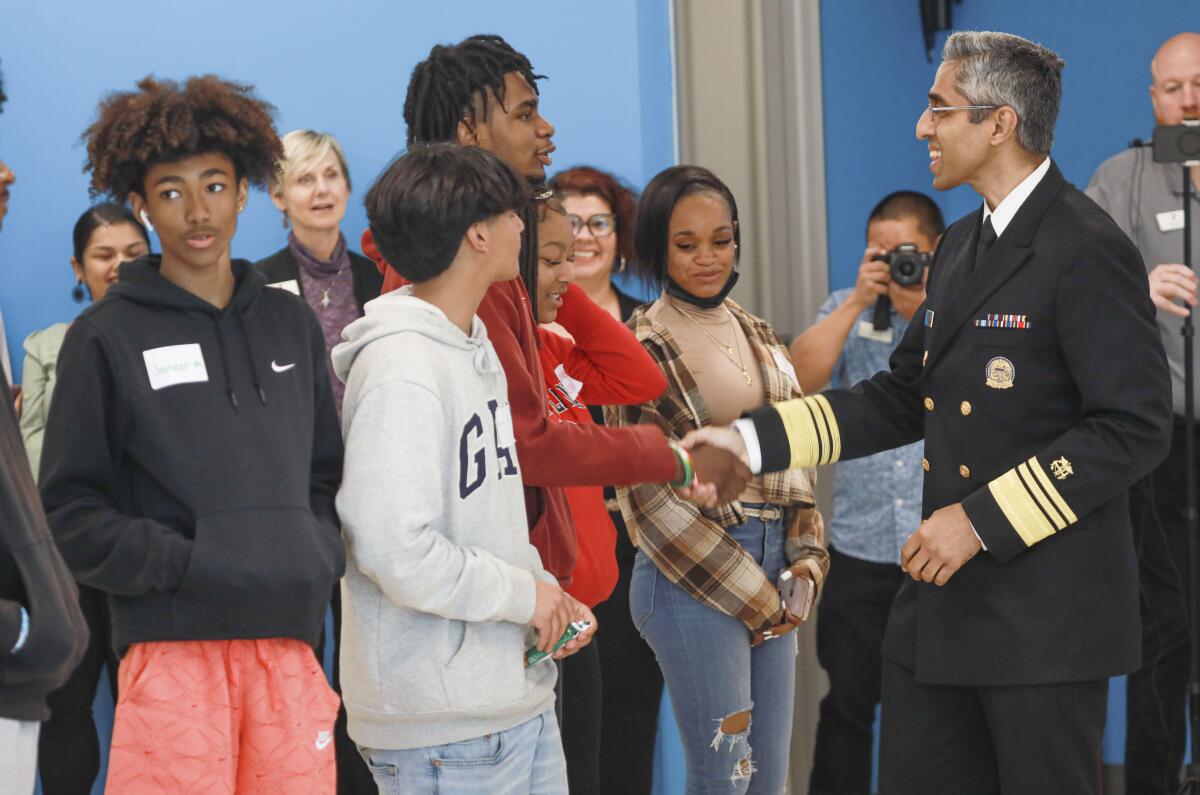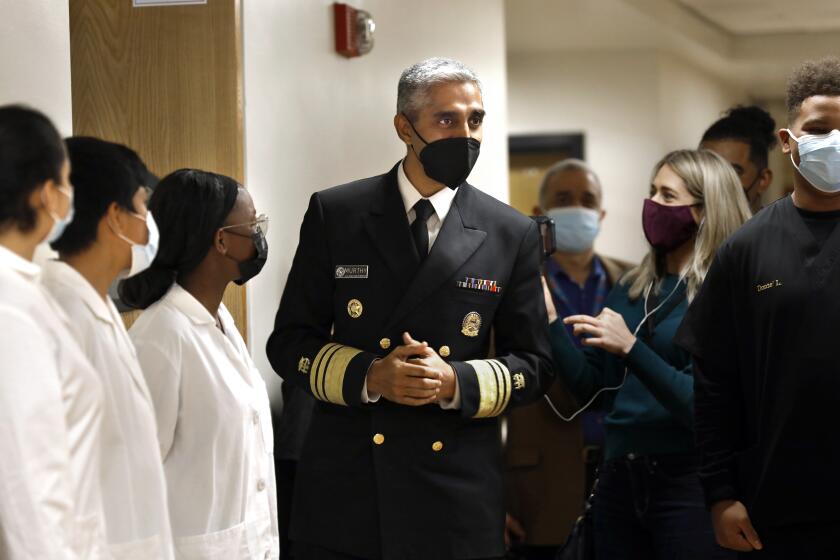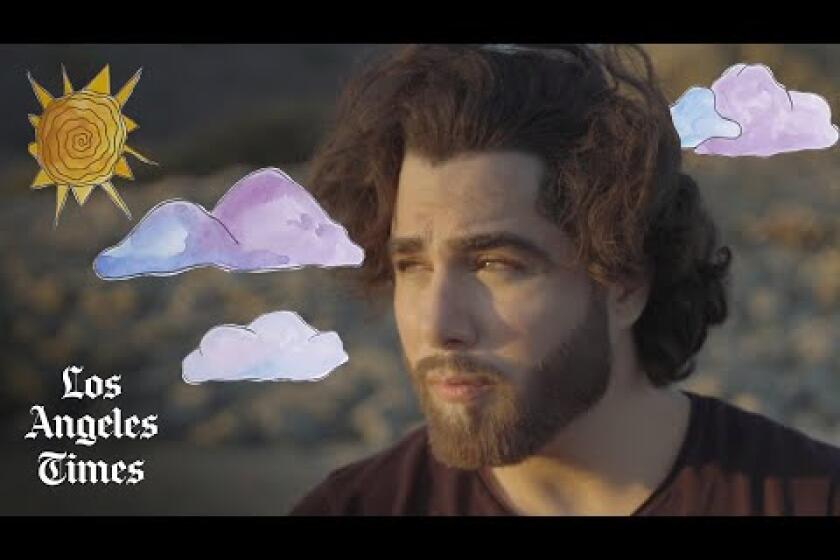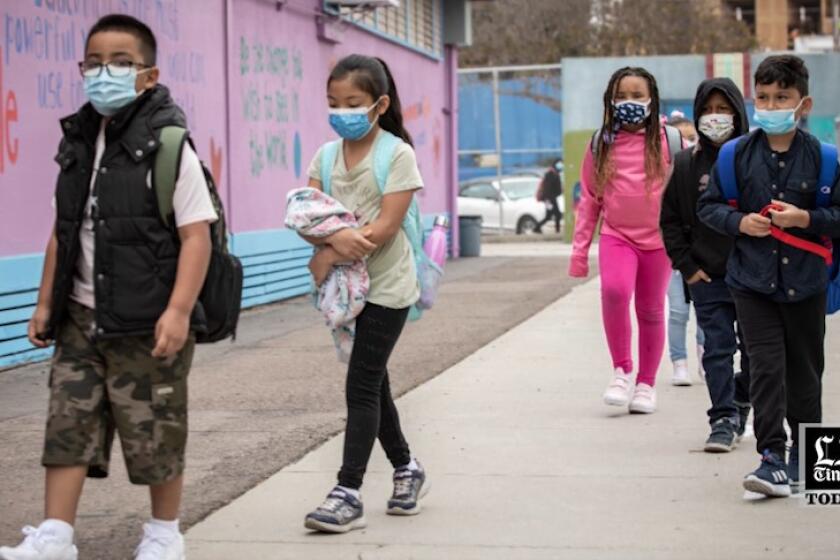Surgeon general discusses mental health with Southern California high school students

- Share via
SAN DIEGO — Dr. Vivek H. Murthy’s mission as surgeon general is to tell the American people about pressing health issues, but Monday afternoon at a YMCA in the San Diego neighborhood of Mountain View, he came to listen.
About 25 students from Lincoln High School and Gompers Preparatory Academy met with Murthy at the Jackie Robinson YMCA, where they shared issues about their own mental health and told him how their lives had been affected by the pandemic.
“We’re going to share this feedback with some of the community leaders we’re going to be meeting with today and tomorrow,” Murthy said. “And the second thing we’re going to do is share it with our larger department at Health and Human Services, which oversees healthcare for the whole country.”
In December, Murthy issued the advisory Protecting Youth Mental Health, which includes data from national surveys that show a growing number of young Americans are acknowledging serious mental health challenges. Surveys cited in the advisory found 1 in 3 high school students and half of female students reported persistent feelings of sadness or hopelessness, an overall increase of 40% from 2009.
The advisory is to call attention to a “youth mental health crisis” and recommend resources to call on and actions to take.
Data from the National Center for Health Statistics suggest more than 6,600 people in the 10-24 age group died by suicide in 2020, and suicide rates in that age range increased by 57% between 2007 and 2018, the advisory reported.
Since the release of the advisory, Murthy has had some discussions with youth in other cities, which he said will help shape policies going forward.
On Monday, he led students through a series of exercises that involved asking them to move to either side of the room in response to certain questions, which prompted extended discussions and some personal stories.
Almost all students said they believe people have a hard time talking about their mental health, and all students agreed that mental health should be a top priority.
“I feel mental health affects all parts of health,” one girl said. “For me, I got sad, and I didn’t eat for four days.”
Asked how their mental health was affected by the pandemic, most agreed it had been a negative experience.
“It was boring,” one student said. “I couldn’t hang out with my friends.
One boy, however, saw the lockdown as a positive because he had more freedom at home than he did at school.
The founders of the Painted Brain, a peer-support nonprofit, use their experience with managing their own mental illness to help others.
During an exercise about social media, a male student told Murthy that he has a particularly hard time quitting video games, while another exercise prompted a female student to say a friend of hers had trouble getting adequate mental health care because of its costs.
“She pointed out that she had seen disparities in her own community,” Murthy said after the event. “A lot of young people have so much experience with this, because a lot of them and their friends are struggling. They’re starting to see where the system is broken and where it needs to be fixed.”
Murthy said he came away from the meeting encouraged about how much insight students had about mental health.
“That bodes well for our ability to address this crisis,” he said. “I believe that to really be successful in addressing youth mental health, we’ve got to get youth engaged.”
Meeting with reporters before the exercises with students, Murthy said he issued the advisory as a call to action and to highlight youth mental health.
“We have to do better by our kids, and we’ve got to do that by investing in more treatment and making that treatment accessible to them,” he said, adding that it takes an average of 11 years before a child gets evidenced-based treatment after first experiencing symptoms.
“That’s not acceptable,” he said. “We’ve got to do better in providing treatment, and we’ve got to do better in terms of investing in prevention.”
Murthy’s advisory also called for society to eliminate the stigma associated with mental health so more people will get help.
“No young person should ever feel that they need to be ashamed of needing help,” he reiterated Monday. “We should make help available to all those who need it. It should be affordable. It should be accessible.”
While in San Diego, Murthy also attended a Monday evening “fireside chat” at the Manchester Grand Hyatt on the effects of loneliness on physical and mental health.
Tuesday morning, he took park in a session with active-duty military families to discuss their experiences building community while serving during the pandemic.
More to Read
Sign up for Essential California
The most important California stories and recommendations in your inbox every morning.
You may occasionally receive promotional content from the Los Angeles Times.

















